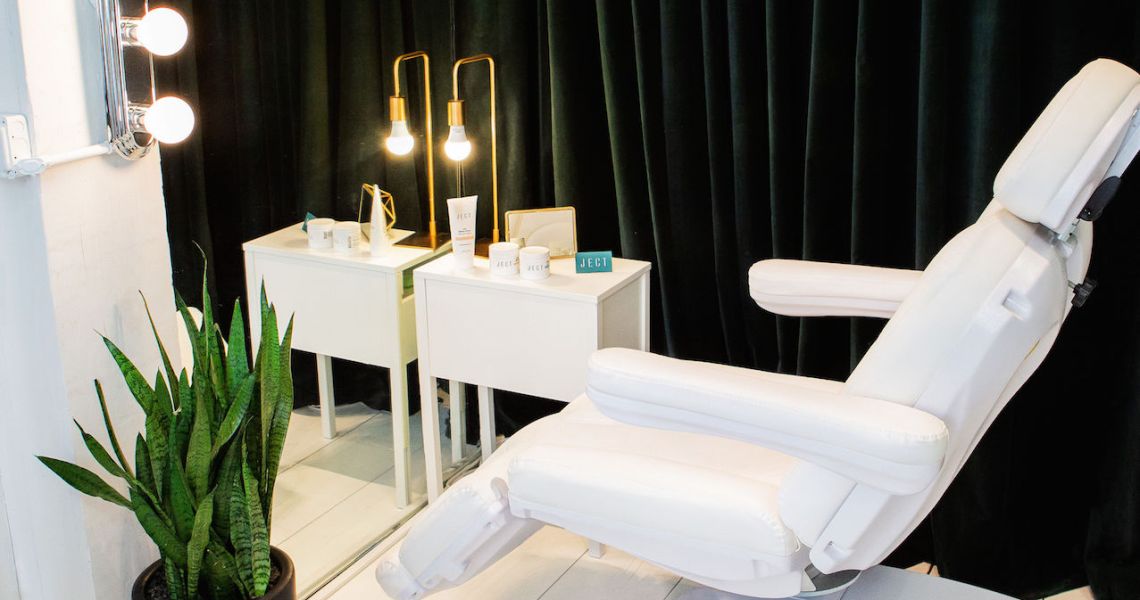Injectables service bars that offer Botox and filler are feeling the financial pinch like the rest of the beauty industry.
Some companies, such as Ject and Ever/Body have started to rely on free virtual consultations to continue engaging with prospective and existing customers. Others, like Alchemy43 and Plump, have opted out. Injectables is a particularly vulnerable beauty category, as services cannot be performed outside of a physical location. And price-sensitive customers are not likely to indulge in repeat services that can cost from $300 to more than $1,000 per session, with an impending economic recession.
Ject has not furloughed any of its 12 employees at its three NYC-based locations; those employees are now handling virtual consultations, said Devon Nagelberg, Ject co-founder and head of brand. Both virtual and in-person consultations have been available since the company launched in February 2019, but the company has seen a 1,000% increase in virtual consultations since its locations closed on March 19. During those consultations, Ject medical providers are able to recommend Ject skin-care products, which can be bought via e-commerce; monthly product sales have experienced a 150% increase since March 19. Additionally, those who pre-purchase services receive a 20% discount on pricing; Nagelberg declined to disclose the number of clients who have pre-purchased services in the last month. Ject’s average customer is between 23 and 38 years old.
“I think people have a lot more flexibility with their schedules and are taking advantage of virtual consultations,” said Nagelberg. “People are at home looking at a close mirror; they’re on Zoom calls; they’re asking themselves, ‘What can I do?’ ‘How can I make my skin look good?’”
In addition to virtual consultations, Ject has focused on creating enhanced educational content for social media and adding a give-back component to its communications. Ject has “severely” cut back on its advertising, although Nagelberg declined to cite exact figures. Ject has 9,000 followers on Instagram and is holding Instagram Live sessions once a week. On the platform, captions on posts are now longer to provide more information on product ingredients, dermatology infographics and lifestyle recommendations. Additionally, Ject has increased email outreach from about three emails per month to twice a week.
The revenue of NYC-based Plump, a comparatively smaller company, dropped by 100% after closing its three locations on March 17. The company has an emergency fund it relied on until the week of April 13 to pay its staff of 10 people. The company has now laid off all of the staff, said Richelle Oslinsker, Plump co-owner and head of operations. The Plump team has made a conscious decision not to conduct virtual consultations or to offer pre-purchases at a discount. This is because the team felt it could not adequately offer consultations and advice via phone or computer, and did not want to oversell its services.
“It’s been really hard, to be honest,” said Oslinkser. “We aren’t selling anything, and we don’t have skin-care [e-commerce] — but we don’t expect to go under.” She said that the company has deferred its rent payments and is working on a deferred payment plan for aesthetic providers like Allergan and Hydrafacial.
When asked whether Plump could lose out on customers who migrate to competitors that offer virtual consultations or discounts, Oslinsker said she is not concerned. She said 85% of Plump customers are repeat and that injectable customers are more loyal because they are less likely to experiment with a provider of semi-invasive treatments. And while Plump is still answering emails and posting on social media, it has winded down its outreach to avoid annoying customers.




